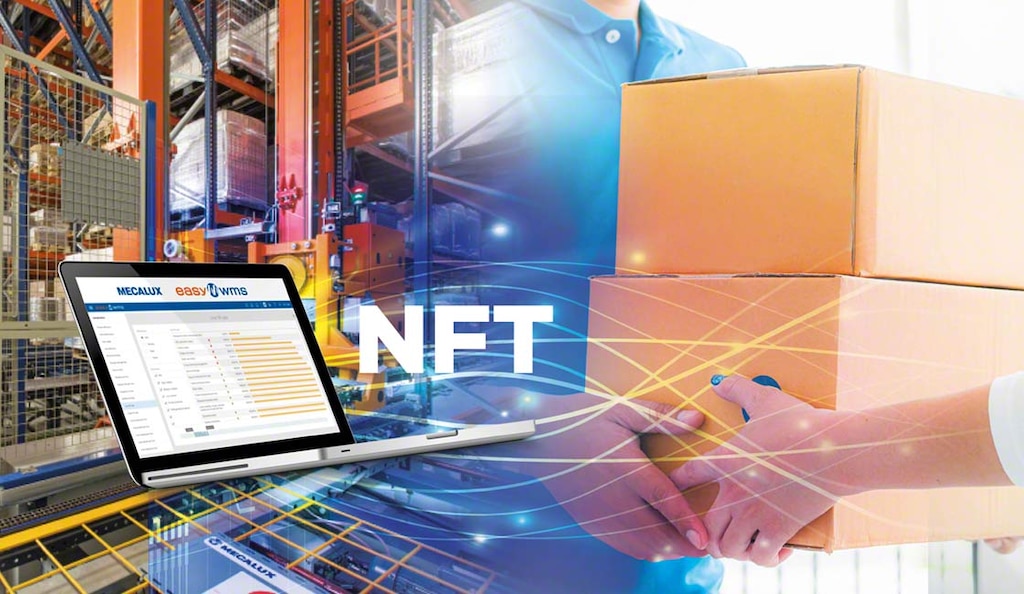
NFT supply chain: how would it work?
NFT is blockchain-related technology with huge potential for logistics, as it could ensure much more accurate traceability control. NFTs are digital documents that make it possible to uniquely identify products with their owners and include certain additional details. As this information can’t be manipulated, trust is strengthened among the various supply chain stakeholders.
This technology provides a complete record of all the phases a product has undergone, which is critical information for businesses in sectors such as the food industry.
But what exactly are NFTs? And how can they be used to improve supply chains? We’ll tell you all about it in this post.
What are NFTs?
An NFT (non-fungible token) is a digital document similar to a contract that is registered by means of blockchain technology. This means that NFTs enjoy the benefits of blockchain: since they’re publicly visible, any changes made are saved, and they can’t be modified by a third party. According to the NFT Yearly Report from NonFungible.com in collaboration with L’Atelier BNP Paribas, the global NFT market tripled its growth in 2020, reaching a total value of $250 million.
What really makes NFTs special is the fact that they’re non-fungible. That is, they’re irreplaceable, as opposed to bitcoin or ordinary money. No two NFTs are the same. A coin or bill, on the other hand, can be substituted by another one without its value being affected. Unlike cryptocurrencies, NFTs weren’t created to be used as a form of payment, but rather to certify the owner of certain assets. To date, these assets have been primarily digital. This information remains recorded in the blockchain (which, in the case of NFTs, is developed by the company Ethereum), ensuring that these contracts remain unchanged as well as public (everyone knows who owns what).
Anyone can have access to NFT data, since the network isn’t centralized, but only the owner of the NFT can destroy it or transfer ownership to another person. An NFT can uniquely identify anything from a photo to a work of art — even a simple tweet. In fact, Twitter founder Jack Dorsey sold the first tweet ever as an NFT for $2.9 million.

NFT supply chain uses
NFT technology is still in the experimental stage, and specific applications in industry are still being explored. However, NFT solutions geared towards logistics and the supply chain have started to pop up. One significant contribution of this technology to the supply chain has to do with traceability and the tracking of a specific product.
Thanks to NFTs, we could know the metadata for certain products, for instance, their current owner, where they are located, and characteristics such as their weight, size, and certifications. This information is updated in the NFT, which remains stored in the blockchain network as the product advances along the supply chain. When the goods arrive at their destination, it’s possible to access a reliable, detailed history of the entire journey of the product, from its origin up to the minute it’s delivered.
The advantages that NFTs would bring to logistics can be summed up as follows:
- Security. The transfer of information between the various supply chain actors is extremely secure. NFT data are stored in the blockchain network in the form of a smart contract, preventing the information entered from being destroyed, eliminated, or reproduced without authorization. Everything is recorded in each of the nodes comprising the network.
- Traceability. When working with food, pharmaceutical products, chemicals, and/or perishable items, it’s important to know what logistics and manufacturing processes the goods have gone through, where they have been, and for how long. NFT technology offers total transparency, so anyone can obtain complete product traceability information in real time.
- Responsibility. Who’s responsible for the goods in the various stages across the supply chain? With NFTs, we can find out who’s in charge of a product at any given time. In addition, to issue an NFT, both parties must enter into a liability agreement. In other words, an NFT can’t be sent if the counterparty doesn’t agree to receive it, just as the goods won’t be delivered if the responsible party hasn’t received the NFT.
Generally speaking, the main advantage of NFT technology in logistics has to do with security, agility, and transparency when consulting and transferring all information relating to a specific product.
Improved security and traceability
Today, NFT technology is still in the early stages and has a high margin for growth. As with bitcoin, one of the most widely used cryptocurrencies, NFT technology has gained a strong foothold in the era of digital transformation, and interest in it is growing. But only time will tell if NFTs will become routinely integrated into the physical world of logistics.
Want to take the digital transformation of your processes and facilities a step further? At Interlake Mecalux, our team of professionals is prepared to implement the necessary technology to bring your business up to speed with Industry 4.0 standards. Be sure to get in touch with our team of experts so we can assist you.
